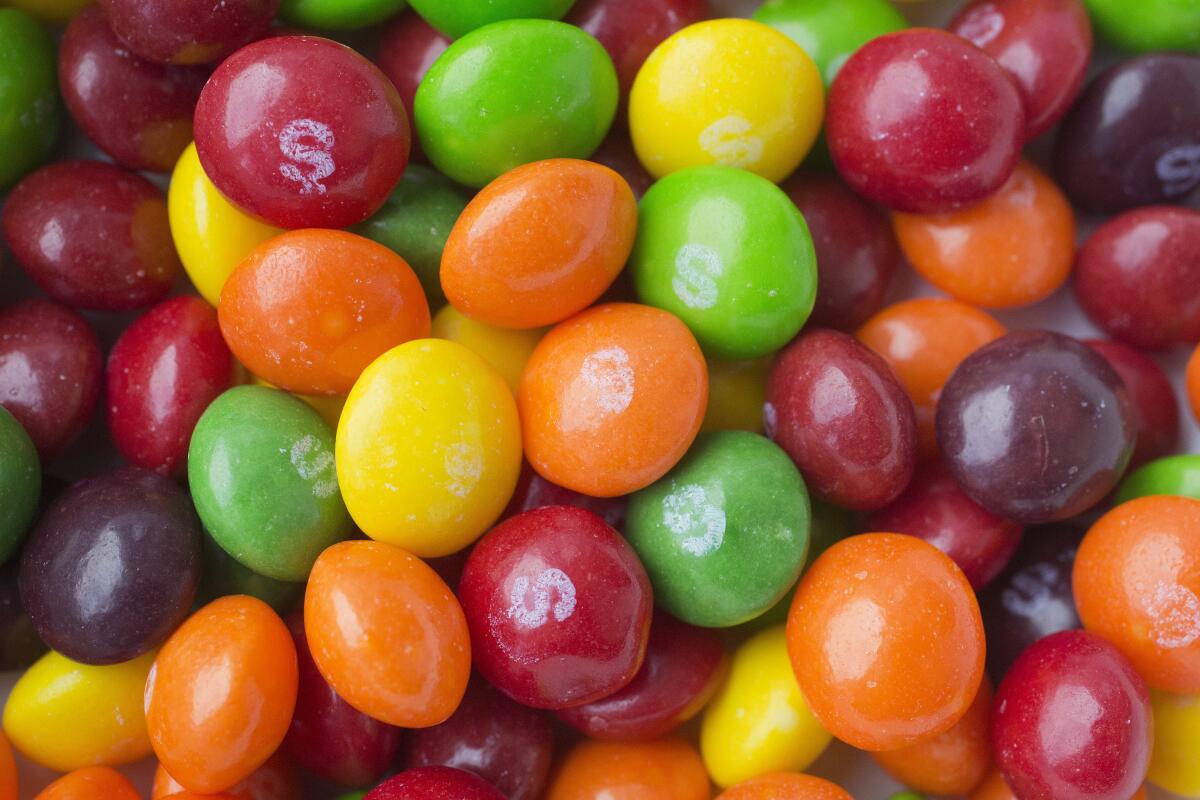End of the rainbow? California bill targets Skittles, other snacks with ‘toxic’ chemicals

- Share via
Candy and snacks at your local market could be made with different ingredients if a bill proposed by California Assemblymember Jesse Gabriel is voted into law.
Last month, Gabriel (D-Woodland Hills) introduced AB 418, which would ban the sale, manufacture and distribution of foods containing chemicals that have been linked to health concerns including decreased immune response, hyperactivity in children and increased risk of cancer.
LAUSD bus drivers, custodians, teachers, classroom aides and cafeteria workers join wet, cold picket lines at shuttered schools across the district.
The bill would make California the first state to ban the sale and manufacture of foods containing the chemicals, according to a release from Gabriel’s office.
The chemicals, currently banned in the European Union, are found in numerous snack staples including Skittles, Ding Dongs (with red heart sprinkles) and a host of other ubiquitous food items.
However, Gabriel doesn’t mean to deprive Californians of Skittles and other treats.
“I love Skittles. I love Wild Berry Skittles. I eat them all the time,” Gabriel said. “I would vote against a bill to ban Skittles.
“What we’re really trying to get them to do is to change their recipes,” Gabriel told The Times on Thursday. “All of these are nonessential ingredients.”
Skittles and other products still line the shelves of stores in Europe, Gabriel noted, but they have different ingredients.
“I think the overwhelming likelihood of what’s going to happen would be that they would make minor modifications to their recipes,” Gabriel said.
Skittles parent company Mars faces a lawsuit over the use of the toxin titanium dioxide in the rainbow candy.
California lawmakers backing the bill pointed to a number of scientific studies that showed links between the chemicals — which include red dye no. 3, titanium dioxide, potassium bromate, brominated vegetable oil and propyl paraben — and health issues. In one study cited by Gabriel’s office, titanium dioxide, used in Skittles as a colorant, was found to be associated with decreased immune responses in rats.
A lawsuit filed last year in California against Mars, which manufactures Skittles, claimed that the colorful confections were “unfit for human consumption” due to titanium dioxide.
The substance is approved by the FDA, which says it can make up no more than 1% of the food by weight.
“Californians shouldn’t have to worry that the food they buy in their neighborhood grocery store might be full of dangerous additives or toxic chemicals,” Gabriel said last month in a release. “This bill will correct for a concerning lack of federal oversight and help protect our kids, public health, and the safety of our food supply.”
The National Weather Service confirmed Wednesday that a tornado was responsible for tearing the roof from a building in Montebello.
Dana Hunnes, a clinical dietitian at UCLA Medical Center and assistant professor at UCLA’s Fielding School of Public Health, said she supported the ban but acknowledged the debates that have swirled around some of the additives.
“Certainly some of [the chemicals] are probably more dangerous than some of the others,” Hunnes said in an interview with The Times. “We know parabens, for example, are endocrine disruptors [which affect hormones]. We know red dyes are carcinogenic.”
But Hunnes said questions still remained on whether the results of tests on animals such as rats could be extrapolated to humans.
“And that brings up the question of, why bother testing in animals and showing that some of these [chemicals] cause cancer in animals if we are not going to somehow relate that to human health,” Hunnes said.
Still, Hunnes said that removing some of the chemicals from Californians’ diets would be a good thing.
“Overall, I think the fewer additives in foods and the less processed foods that we eat,” she said, “the better off we will all be.”
More to Read
Sign up for Essential California
The most important California stories and recommendations in your inbox every morning.
You may occasionally receive promotional content from the Los Angeles Times.

















